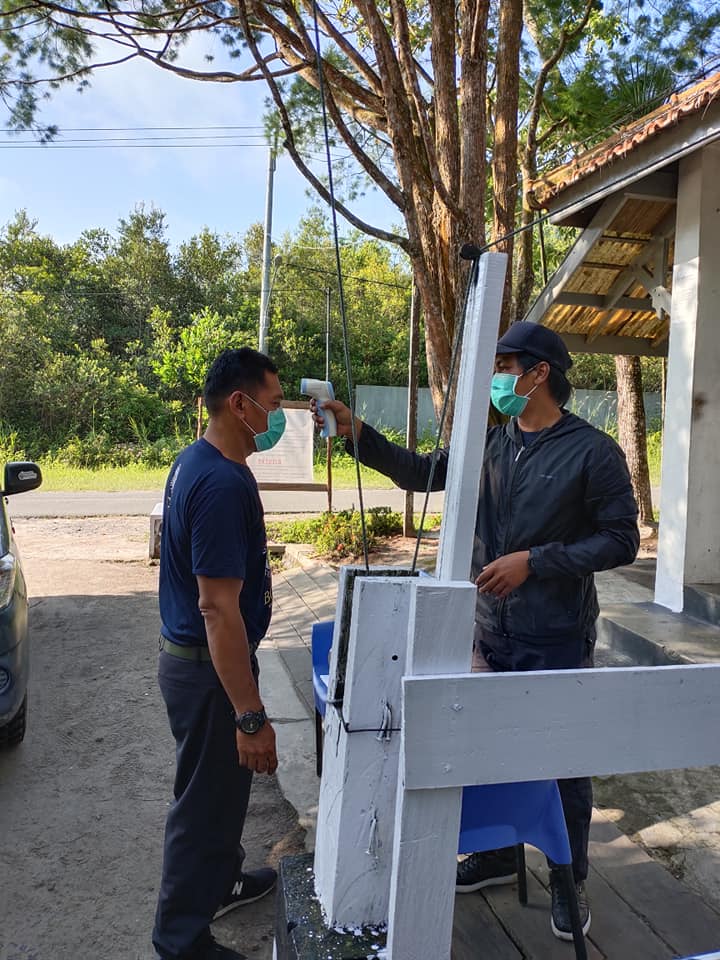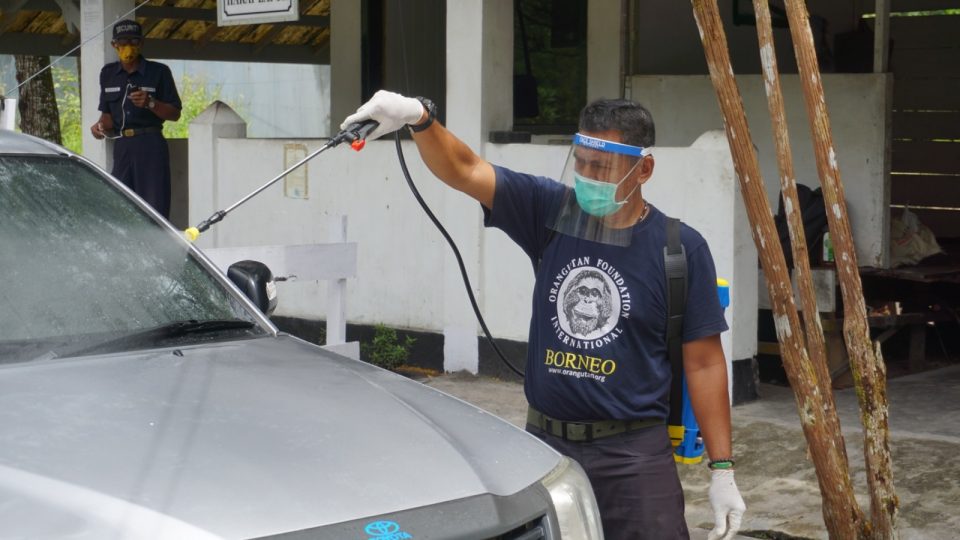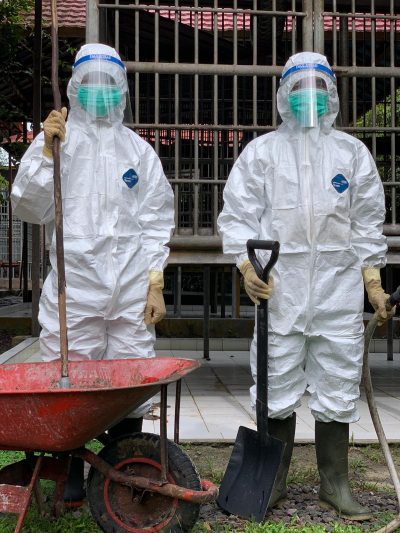Update on COVID-19 as it relates to Orangutans at OFI Facilities

The world is in the midst of a global pandemic. While there have been no reports of the Corona Virus (also known as COVID-19) spreading to great apes, orangutans may be at risk as all great apes are susceptible to catching respiratory diseases from humans. In Borneo OFI is doing everything possible to stop the spread of COVID-19 and to protect the orangutans under its care, including free-ranging orangutans who occasionally come to OFI feeding stations in the forest.
Orangutans are genetically more distant from humans than African great apes, chimpanzees, bonobos, and gorillas, who may share 98-99% of their genetic material with humans. Orangutans share 97% but are still vulnerable to some human diseases. In the wild orangutans are almost entirely arboreal and solitary or semi-solitary in their social organization. Thus, in the wild they automatically practice a type of social distancing from each other, unlike the more social African apes. By staying in the forest canopy wild orangutans rarely interact directly with humans.
Currently in Borneo there are almost 300 individuals at the OCCQ (Orangutan Care Center and Quarantine) including both wild born ex-captive orangutans being rehabilitated for life in the wild and rescued, injured/wounded wild orangutans who are under medical care, recovering from life-threatening situations. Staff at the OCCQ normally consists of approximately 135 people.
Here is an outline of the procedures that OFI has put in place at the Orangutan Care Center and Quarantine (OCCQ) to ensure health and safety during this time.
- The sanctuary/OCCQ is under total quarantine/lockdown. No one except for specific assistants are allowed entry. Quarantine began the first week of March 2020.
- No dignitaries or visitors, no matter how important, are allowed entry.
- No contractors or locals bringing produce, fruit, any supplies or food to the OCCQ are allowed entry.
- All construction at the OCCQ, except for routine maintenance by staff, has stopped.
- All fruit and produce brought into the OCCQ is washed with a mild solution of disinfectant at the entrance of the OCCQ.
- No vehicles, other than OFI vehicles, are allowed into the OCCQ.
- All OFI vehicles coming into the OCCQ are sprayed with disinfectant before being allowed entry.

- Everything that comes into contact with orangutans or is in their vicinity is washed and/or sprayed with disinfectant daily. This includes all containers with food for the orangutans, including wheelbarrows.
- All staff must wear face masks.
- All staff who come in contact with orangutans must wear gloves.
- OFI is working with half the number of assistants as normal, with the other half of staff remaining in self-isolation at home with pay. This helps maintain social distancing.
- Staff are rotated after doing self-quarantine for at least two weeks.
- Assistants change into clean uniforms once they arrive at the OCCQ.
- OFI has installed multiple extra hand washing stations throughout the OCCQ and at the entrance, and staff are required to handwash at entrance and exit to all facilities as well as during the day.
- Assistants have their temperature taken upon arrival. Any assistant with a fever is sent home with pay. Staff also have their temperature taken a second time during the work day.
- Any assistant who doesn’t feel well or is showing symptoms is sent home immediately to self-isolate and recover with pay.
- OFI has suspended all school and education outreach programs.
- OFI has provided extra uniforms for staff so that a fresh uniform can be worn each day while uniforms worn in previous days are laundered.
- OFI is building a hygiene room at the entrance where staff can leave their shoes behind for the day as they change into shoes used only at the OCCQ during the work day and left behind for the night. If staff bring any equipment it can be sprayed here with disinfectant when staff first come into the Care Center.
- Facilities are also available at the entrance where staff can take showers.

OFI also maintains Camp Leakey and a number of release camps in the general vicinity of Tanjung Puting National Park where wild born ex-captive orangutans have been released over the years. There have been no releases or translocations of any orangutans at Camp Leakey for 40 years but a feeding station is maintained as are feeding stations at each of the other release camps. Most of the orangutans who visit these stations are wild born ex-captives or their descendants but occasionally wild orangutans also visit. Camp Leakey is, as it always has been, a research station where the native wild orangutan population is being studied. Only three of the release camps along with Camp Leakey are officially open to the public
The following are additional precautions being taken at Camp Leakey and Release Camps at this time:
- Camp Leakey and Tanjung Puting National Park were officially closed March 19 by the Indonesian government and all guides and tourists were escorted from the park.
- Staff at Camp Leakey and other release camps have all self-quarantined. If a staff member leaves, he/she does not return. Staff at OFI forest camps usually stay for months at a time so this is not unusual.
- Staff wear face masks and gloves when at feeding stations.
- Staff self-distance if orangutans approach on the ground and do not come closer than 10 meters (about 30 feet) unless wearing mask and gloves.
- All fruit and produce is washed with mild disinfectant and dried before orangutans are provisioned at feeding stations.
- Staff still patrol since, while the Park is now empty of tourists, visitors, and guides, more opportunities exist for poachers, bird catchers, and other actors to enter the Park and extract resources illegally since few eyes are watching and reporting to authorities.
But while we are doing everything to help staff and orangutans stay healthy and safe from COVID-19, other problems have reared their not-so-attractive heads. New enclosures, which are desperately needed and were in the process of being constructed, remain half built as we cannot allow external skilled workers entry into the OCCQ to finish these projects. As mentioned above, Tanjung Puting National Park is empty except for a small group of OFI rangers, which may enable maverick loggers and poachers to conduct their illegal activities unhampered and unnoticed. OFI rangers have increased their patrols. The group of OFI rangers currently in the Park have been there over a month and cannot come back if they leave, unless they have selfisolated for 2 weeks. At all of OFI’s release and patrol camps, staff are wearing masks, but, as in much of the rest of the world, supplies are running low. We also had to bear extra costs in supplying all our staff with additional uniforms.
We are doing our best to protect the orangutans and the people who care for them. We continue to provide care for the almost 300 orangutans in the OCCQ. We continue to feed and rehabilitate and rescue orangutans from the wild. We continue to pay the devoted staff even as they self-quarantine. Without our dedicated staff, we would not be able to save orangutans and protect forest habitat. We continue to try and buy all the necessary safety equipment, but these items are a scarce resource and, for that reason, expensive to boot. We continue to monitor the situation and are working closely with the local health department, local forestry, and local government here in Kalimantan and are following recommendations from our OFI veterinarians as well as regional government health officials.
As we move forward in these uncharted waters, please know that we at OFI very much appreciate your support and hope that all is well given the uncertainties on the horizon. Please stay inside, wash your hands, get as much rest as possible, exercise if possible, find joy, love friends and family, and stay safe. The orangutans and forests still need all the help they can get.
The maintenance of social distance remains important. An adult male orangutan’s arm span can easily exceed six feet – please remember to keep that distance between you and other people. More if you encounter an orangutan!


